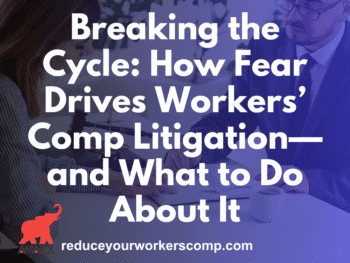Hello, Michael Stack here with Amaxx. We’re coming up on the WCRI Annual Issues and Research Conference being held in Boston next Thursday and Friday, March 10 and 11. This is one of my favorites conferences of the year.
Click Link to Access Free PDF Download
“How To Avoid, Manage, And Win Workers’ Comp Claim Litigation”
I have an accounting and CPA background, so the numbers, the data, the analysis, the summaries that WCRI puts together create very actionable items of how we can improve our industry moving forward, and they take the emotion out of that process to come to those conclusions. Today, I want to review one of my favorite studies that WCRI completed a few years back, and then I also want to give you a short preview of what’s going to be covered in next week’s conference.
Avoiding Litigation. What can Employers, Insurers, and State Worker’s compensation Agencies Do?
Fear of Being Fired
One of my favorites studies that I reference the most throughout the course of my trainings is called Avoiding litigation, what can employers, insurers, and state worker’s compensation agencies do? In this study, they analyzed over 6,800 claims across 11 states and looked at the factors that went into why those injured workers hired an attorney. There were a number of results that came from that study. Today, I want to highlight the top 3 findings that they discovered.
The first one was a fear of being fired. The injured workers had a fear of being fired, and if this factor was present, that injured worker was 2 to 3 times more likely to hire an attorney. Again, if the factor of the fear of being fired was present, that injured worker was 2 to 3 times more likely to hire an attorney.
Supervisor Questioned Legitimacy of the Claim
The second major finding from that study is that the supervisor, their direct supervisor, was perceived to question the legitimacy of that claim. They thought that they were either faking it or exaggerating their injury. If that factor was present, they were 8 to 18% more likely to hire an attorney.
Perception That Claim Was Denied
The third factor was their perception that their claim was denied, so whether real or imagined, their perception that their claim was denied. If this factor was present, they were 2 to 3 times more likely to hire an attorney, very similar to the first factor of the fear of being fired.
Employer Training and Communication
As we look at these findings, and again, like I said, one of my favorite things about WCRI is it takes the emotion out of how we improve our industry. How do you take these findings and now create actionable items to improve your program, to improve the program of your clients? Let’s take at these. When I look at this board, really numbers 1 and 2 fall directly on the employer. It’s all about training, it’s all about setting expectations and it’s all about communication. Fear of being fired and the supervisor’s questioning of legitimacy, that can easily be fixed with training and communication.
This third piece and the perception that the claim was denied as being a major factor of why injured workers are hiring attorneys; that to me is falling on a couple of different parties. That falls on the employer and again with their communication. It also falls on the adjuster, and it also falls on both of those, really that whole team of claims management and looking at that process. We all know that there’s a number of different items and different factors that can be at play in a claim being delayed, not getting enough information, etc.
What is your process that you’re using at your organization? What is your communication system in order to be able to communicate this information to the injured worker. Because if their perception is that their claim was denied even though it wasn’t and they hire an attorney, they’re going to delay that claim. They’re going to make that claim a lot more expensive just because you didn’t make a phone call, you didn’t send them a letter, you didn’t give them enough update on what was happening with their claim. Actionable items based on studies, based on research, based on taking the emotion out of that process.
WCRI Annual Issues & Research Conference 2016
All right. Now, let’s take a quick look at what they’re going to be covering in next week’s conference. A lot of great topics. I took a look at the agenda, and there were a couple that stood out to me, particularly the first 2 sessions on Thursday morning. Going over fee schedules and case-shifting as well as the worker outcomes across states, and then that afternoon really diving deep into the sessions on opt outs. Check out the agenda, a lot of really great information. I’m looking forward to being in attendance. If you are in attendance, I would love to say hello to you, so feel free to definitely come over, say hello, and introduce yourself. I’d love to have a discussion with you.
I look forward to seeing you hopefully next week at that WCRI Conference. My office is just outside of Boston in a town called Hingham, so it’s an easy local conference for me to attend, and hopefully you will as well.
Always remember, your success in worker’s compensation is defined by your integrity, so be great.
Author Michael Stack, Principal, COMPClub, Amaxx LLC. He is an expert in workers compensation cost containment systems and helps employers reduce their work comp costs by 20% to 50%. He works as a consultant to large and mid-market clients, is co-author of Your Ultimate Guide To Mastering Workers Comp Costs, a comprehensive step-by-step manual of cost containment strategies based on hands-on field experience, and is founder of COMPClub, an exclusive member training program on workers compensation cost containment best practices. Through these platforms he is in the trenches on a working together with clients to implement and define best practices, which allows him to continuously be at the forefront of innovation and thought leadership in workers’ compensation cost containment. Contact: mstack@reduceyourworkerscomp.com.
©2016 Amaxx LLC. All rights reserved under International Copyright Law.
Do not use this information without independent verification. All state laws vary. You should consult with your insurance broker, attorney, or qualified professional.



























